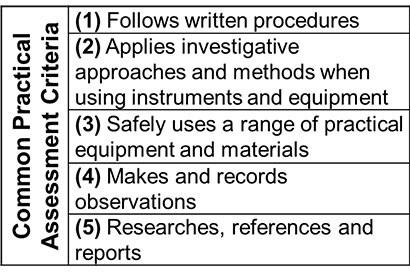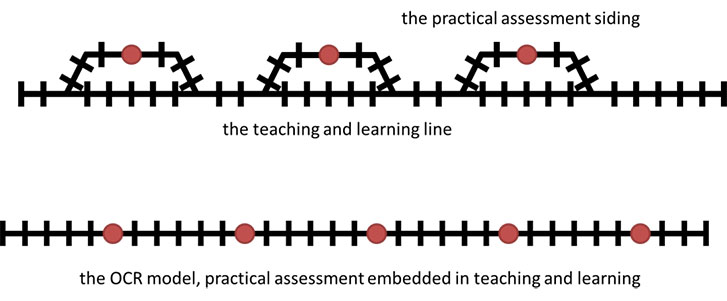The Practical Endorsement is the way forward! - Asma Zahid
18 November 2016
Following the first year of teaching the reformed science A Levels, here’s an update of the key things you need to know about the Practical Endorsement and progress since its introduction in 2015.
What is the Practical Endorsement?
Introduced for the new A Level specifications in Biology, Chemistry and Physics for 2015, the Practical Endorsement requires and enables all learners to develop practical skills through performing at least 12 practical activities across the two-year course of study. The skills, apparatus and techniques that must be covered have been specified by Ofqual and are the same for all exam boards.
Common assessment across all boards is achieved through a set of Common Practical Assessment Criteria (CPAC, Fig. 1). These define the standard required for a Pass. All centres offering science A Levels will have to ensure that their learners are doing practical work that is not only relevant to their science but also allows them to demonstrate competence against the CPAC.

Fig 1: The Common Practical Assessment Criteria (CPAC). Full descriptions of all criteria are given in the science A Level specifications.
OCR's approach to the Practical Endorsement
At the core of our approach is flexibility. Our model for the Practical Endorsement consists of 12 Practical Activity Groups (PAGs) for each science, which describe the types of practical work each learner should carry out in order to cover all the required skills, apparatus and techniques. Teachers can select any appropriate practical activities, including from the 36 activities that we have made available for each science. Our model gives teachers the authority and flexibility to plan practical work to suit their own situation. A key aspect of this is choosing activities that support how the course is being taught, so that practical work is integrated into the teaching and learning line (Fig. 2).

Fig 2: The OCR model for the Practical Endorsement encourages integration of practical work into the teaching and learning line.
Monitoring
Monitoring involves reassuring centres that they are implementing the Practical Endorsement appropriately. We have recruited current and retired teachers across the country to carry out monitoring visits in their local area. OCR’s approach to monitoring is very much about support and advice; we speak with lead teachers at the centre visited and answer any queries they may have about the Practical Endorsement. In many cases this is just some validation of the processes they have adopted or guidance on how to use the OCR PAG tracker – a tool that teachers have overwhelmingly found useful.
Many centres we visited at the end of the summer term were already evaluating and adapting their practices towards the Endorsement based on their experience so far, making full use of the flexibility the Endorsement allows.
The positive impact
As the Lead Monitor for Practical Endorsement at OCR I have experienced the positive impact of the changes to practical activities and the development of excellent practices within schools. Learners have made very positive comments about the new Practical Endorsement, and practical work is flourishing. Some of the comments included:
“Learners agreed that this was a better way of doing assessed practical. A number of learners commented that they appreciated the opportunity to look again at their work and set it into the context of their other learning on the subject and also to research the reasons behind their results.”
“All students were on task and getting on well with their work. They were finding A Level much more challenging than GCSE but seemed to be coping. They were enjoying their practical work and liked the new regime better than the Controlled Assessment. They could see that the practical that they were doing fits into the theoretical work that they are doing in other lessons.”
“Students were questioned on how they were finding the Practical Endorsement and all of them said they were enjoying the practical experience and found it helpful in applying what they had learnt in theory lessons. They felt it was much more rigorous than the GCSE practical they had done previously.”
Here are some tips that will help you be successful with Practical Endorsement:
- All practical activities help develop learners’ skills and techniques when using different apparatus and thus can be included as evidence of competence
- The learner record (which could be kept in a lab book, files, e-portfolio etc.) should be a contemporaneously kept working record; it does not need to be a pristine document that requires re-writing
- Learners need to be taught how to use apparatus they are unfamiliar with; this is key to teaching and learning
- Not all learners will develop skills at the same time; skills should only be recorded as ‘achieved’ when they demonstrate competence
- Having ‘not achieved’ skills or techniques on occasion does not preclude a learner from achieving a ‘Pass’, as long as competence has been demonstrated in all skills and techniques by the end of the course and the CPAC have been fulfilled
- Learners do not ‘pass’ individual practical activities; practical activities allow them to demonstrate a range of skills, and a final judgement using the CPAC criteria is made at the end of the two years
- Follow guidelines set out in the ‘Practical Skills Handbook’ for your science
- It is beneficial for all teachers and technicians to complete the online training for the Practical Endorsement.
To conclude
We are really pleased to see centres embrace the challenges with gusto and getting to grips with the new approach. Through both the monitoring visits and our Subject Specialist support we have been able to provide clarification and reassurance where needed. With one year of teaching now behind us, teachers are building confidence in this new approach.
Send us your feedback in the comments section below, and if you would like to get in touch with us then please email us via pass@ocr.org.uk or send your Tweets to @OCR_Science
About the author
 Asma Zahid - Subject Specialist - Biology
Asma Zahid - Subject Specialist - Biology
Asma joined OCR in October 2015 after teaching in independent and state schools for seven years. She brings her passion for teaching practical science to her new role as a Lead Monitor for the Practical Endorsement. Asma has developed and delivered training for the new approach to Science practicals to teachers nationally. She has set up and run the first tranche of monitor recruitment, training and standardisation and manages monitors across the UK.
Before teaching, Asma worked as a Project Manager on developing services for people with dementia and their carers. In her spare time she enjoys reading, painting, travelling and baking cakes whilst also being kept busy by her two boys.